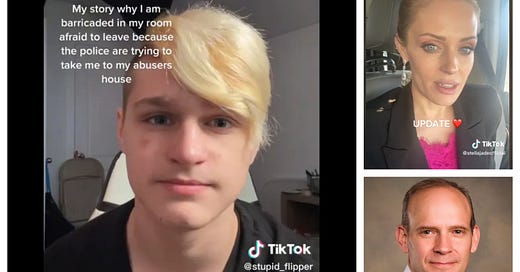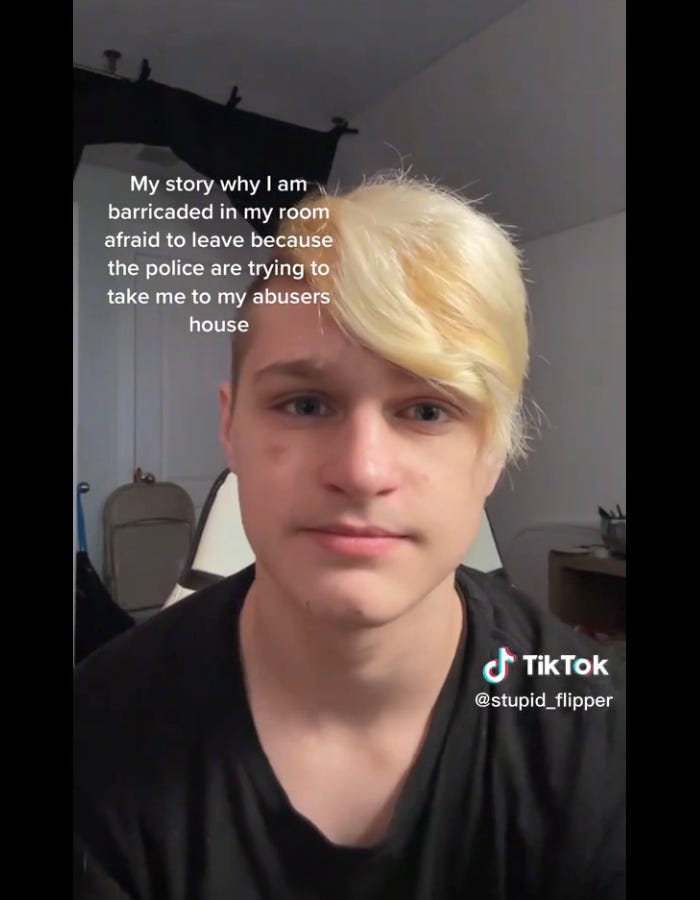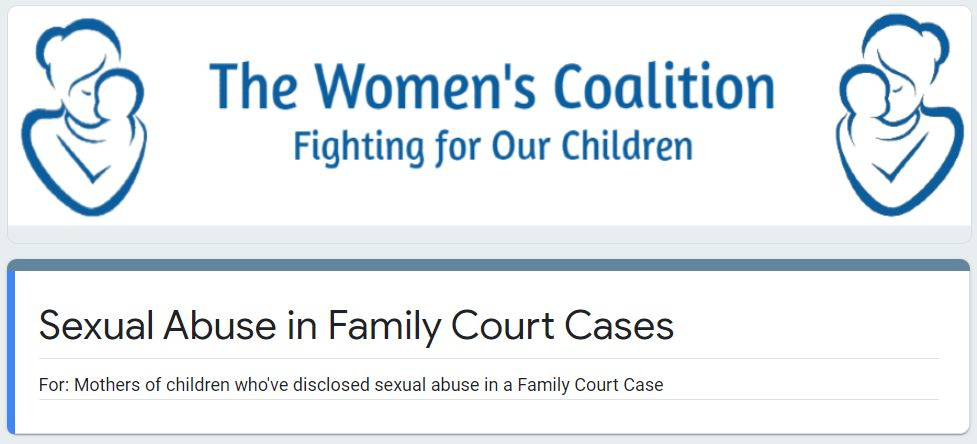Teen Barricades in Room: Refuses Reunification with Molester Father
And: Are PPO's Aiding Abusive Fathers?
When a Utah Family Court judge ordered nearly 16 year-old Ty to visit with his father, and the Sheriff was tasked with taking him, he barricaded himself in his room. He’s been hunkered down there ever since mid-December, except for a short excursion or two.
After over a month of barricading, he decided to go public.
Ty’s TikTok went viral with over 300K views. He tells his story in 3 minutes—how at 10 years-old, he finally told about his father physically and sexually abusing him since he was 3, and his little sister, Bryn, too. Fortunately, the abuse was substantiated, they were allowed to live with their mother and were not made to visit their father.
Fast forward to December and Utah County Judge Derek Pullan decided Ty and Bryn should start visiting their father again. His reasoning? That this may be the last chance to salvage a relationship between their father and them.
Research and common sense support that a child who has been sexually abused should not be forced, or even encouraged, to have a relationship with their molester/rapist, even if he is their father, even if visits are supervised. Sexual abuse is such a serious crime, often causing identity disturbance and dissociative disorders, that children cannot fully recover if their abuser is allowed to have a relationship with them. Children can decide for themselves whether or not they want to see their abuser when they are adults.
Sexual abuse should trigger an automatic termination of a parent’s rights. But the opposite is occurring in family courts. Judges are routinely covering up and enabling sexual abuse by fathers and terminating custodial and parental rights of mothers like Laney who try and protect their children.
Instead of terminating his parental rights, Judge Pullan has given a substantiated child molester sole custody. This is a clear manifestation of the underlying patriarchal structure of Family Court.
COMMUNITY SUPPORT
Not surprisingly, Ty succeeded in getting a ton of community support, because regular folks do not support kids being placed under the control of their named sexual assaulter. Also not surprisingly, Judge Pullan did not budge. Instead, he went even further on Monday and gave the father “temporary” sole custody.
Starting with temporary custody to the father is a common tactic that gets around the requirement for due process—a trial before changing custody. It is easily transitioned to permanent later when the kids are settled in to their new life with their father.
Ty’s mom, Stella, posted this update after the hearing last week. She was obviously upset about the custody switch, but relieved she had not been thrown in jail, as had been threatened. Jailing of mothers is often used to get kids to comply with living with their abusive father.
Stella was also relieved that Judge Pullan did not order a four-day reunification program. But now that the father has sole custody, he can likely take them to any kind of therapy he wants.
Ty says his father had often threatened to kill him if he told about the sexual abuse, so he is terrified to be under his control again. He is also afraid he won’t see his mother until he’s 18. Both are justified fears.
So Ty remains barricaded in his room with a 2 x 4 diagonally placed across his door.
A live cam operates 24/7 in case deputies succeed in breaking down his door and taking him.
TALE OF 2 REUNIFICATIONS
There is another reunification that protective/safe parent organizations [PPO’s] are equating with Ty’s. But to lump Maya’s case in with his is confusing, and it diverts mothers and the public from understanding the real problem with court-ordered reunifications.
A video of 14 year-old Maya fiercely resisting being taken to reunify with her mother was shared widely on social media by PPO’s, and Maya’s friends worked with them to stage a protest.
The focus was mostly on the forceful treatment needed to get Maya into the car. However, that distracts from the more important point: Was it justified fear of her mother causing her to resist so wildly, or could that be a result of her father having alienated her?
A friend of the mother’s commented on the PPO’s social media posts defending the mom. She said the children’s mother, Jessica, is actually a wonderful mom and the father had, in fact, turned the kids against her, making the forced reunification necessary. Those comments were deleted.
There is no mention of credible evidence of abuse other than Maya briefly saying her mother had sexually abused her. There is no mention of it being reported to CPS or the police, or any family court investigations having been done. Was her little brother abused too? Why no details? This makes it more possible her father had influenced or coached her.
On the other hand, Ty’s case involved investigations by CPS, the police, a long family court battle, as is the usual in custody cases involving sexual abuse. Ty’s case was even substantiated.
Maya and her brother are still with their mother after over three months. Hopefully this is a good thing and they are safe and happy being with her.
BAD VS. GOOD REUNIFICATIONS
Reunification therapy is not all bad or all good.
It is how judges order reunification therapy that is either bad or good.
To rail against reunification therapy in general without being clear that sometimes it is necessary confuses the issue.
Way too often court-ordered reunification fits into the “bad” category. Judges routinely disregard evidence of abuse by fathers, falsely find mothers to be alienating, and wrongly order reunification with an abusive father. Ty’s case undoubtedly fits in the bad category.
If judges order reunification with a parent who has been truly alienated, it is in the “good” category—they have rightly ordered reunification, which is beneficial to the child. Maya’s case seems to fit into this “good” category.
Good reunification is rarely court-ordered. It is almost always kids being forced to reunify with abusive fathers by Family Court judges.
Lock-down, long-term reunification camps are a whole different story—they should never be ordered. They rarely are, because only wealthy fathers can afford them, so they are not a huge issue in the custody crisis.
As for the therapist’s role: Therapists accept the judge’s findings and set out to convince children that abuse by the parent they are reunifying with didn’t really happen. They get kids to comply with the judge’s order to be with that parent, regardless of the truth. That is their job.
To rail against individual therapists and the alienation/reunification “industry” is useless. There will always be ambulance chasers. And profiting is merely a symptom of the crisis anyway [see: Down the Money Rabbit Hole].
Keep your eyes on the ball:
Judges are the ones responsible for “bad reunifications” not therapists.
More importantly, labeling the reunification problem as the result of bad therapists and an affiliated “industry” indicates gender neutrality. That aligns with the fathers’ rights activists’ [FRA’s] theme of the problem being a gender-neutral “divorce industry”. This is misleading and harmful to our movement.
PPO’s AIDING ABUSIVE FATHERS?
PPO’s have two flagship reunification cases: Maya’s and Suraj’s. Both are cases in which children have been supposedly wrongly reunified with abusive mothers. They claim to be advocating for the children, but are indirectly advocating for the fathers, who may be the ones who are abusive.
Suraj’s father is a documented DV perpetrator and he kept Suraj away from his mom for a over a year while taking him to a private therapist, refusing a neutral one. After this, Suraj no longer wanted to see his mother, who is not abusive and with whom he had previously had a good relationship. This is pretty much the definition of parental alienation.
This information is available online in appellate cases, so it is unlikely the PPO’s were unaware. But they videotaped Suraj complaining about having been forcibly taken to reunify with his mother, with no context.
Maya’s and Suraj’s cases are being used to support their anti-reunification therapy campaign.
Even if it were true that Suraj’s and Maya’s mothers were abusive and those were bad reunifications, theirs would be the extremely rare cases in which judges force children to reunify with a mother. Spotlighting fathers as victims of the crisis is at best misleading and at worst, a deliberate diversion from the fact that the crisis is, indeed, gendered.
This gender-neutralization of the family court crisis is a main strategy of the OBN [old boy network] and their right-hand men—FRA’s. They know if women figure out it is systemic sexism causing the crisis and unite as women, as half the population, to end it, that is the one way they will lose their entitlement to take and abuse their children. So they spend an inordinate amount of energy on portraying the crisis as gender neutral and, apparently, infiltrating protective “parent” groups.
PPO’s are openly gender neutral as the name “parent” implies, but spotlighting fathers as principal victims in reunification cases takes it to another level.
It’s beginning to look a lot like controlled opposition…
SIGN TY’s PETITION: Remove Corrupt Judge Pullan
Join The Women’s Coalition where we are uniting as Women to fight the systemic sexism causing us to lose and be unable to protect our children.
SEXUAL ABUSE SURVEY
The Women’s Coalition is documenting custody cases that involve sexual abuse to support our contention that judges are deliberately disregarding evidence of abuse by fathers.
If you reported sexual abuse of your child in Family Court, please take a minute to fill out this form. You may do this anonymously.
You may also support the Coalition’s work through a one-time or recurring contribution through PayPal:
Join The Women’s Coalition:
Join the global dialogue on social media:










I greatly admire Ty's courage and perseverance as Family Court Judge Derek Pullan attempts to endanger him. Ty should not be terrified and fighting for his safety. He should be safe with his mother. Judge Pullan ignores this teenager's pleas for protection.
Family court judges disregard mothers and children when they present credible evidence of abuse. Patriarchy dominates family court. Children are treated as male property. Their best interests are not relevant. The rights of mothers and children don't exist in family court.
Women are fighting for their children. They are denied due process and equal protection. Trials and transcripts are rare. Family court judges ignore evidence and give custody to fathers. They do not do the same with mothers. Family court judges make up evidence against mothers and punish them. Mothers and children are harmed in family court.
Family court judges abuse their power without consequences. This pattern of abuse is dangerous for mothers and children. It often damages their relationship. Mothers are coming together and gathering strength. We are fighting to end systemic male entitlement in family court. Children have a right to safety. The Child Custody Act will help protect mothers and children.
Would you consider covering WA stories? We have plenty to report, even just this week in Kitsap and Skagit.